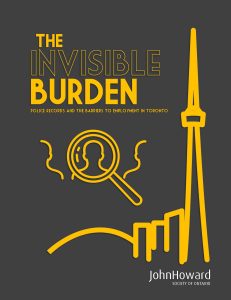Overview:
While the Canadian public assumes that a sentence for a crime is finite in length, in fact criminal records can have serious negative effects on people’s lives and careers long after their formal sentences are over. In particular, a police record can make it difficult or impossible to get a job, or to enter an education or training program, even when the crime is irrelevant to the job or education being pursued. In order to get a better understanding of the negative effects of police records on employment potential of Torontonians the Centre of Research, Policy & Program Development (the Centre) at the John Howard Society of Ontario (JHSO) conducted in-depth survey (n=35) and interviews with employers (n=4) and a focus group with 8 individuals with police records. The research, supported through funding from the Metcalf Foundation, continued to build on the previous findings from JHSO’s and other community agency’s work on the deleterious effects of police records on employment.
Resources
Key Takeaways
Research Highlights
PURPOSE OF CONDUCTING POLICE RECORD CHECK:


